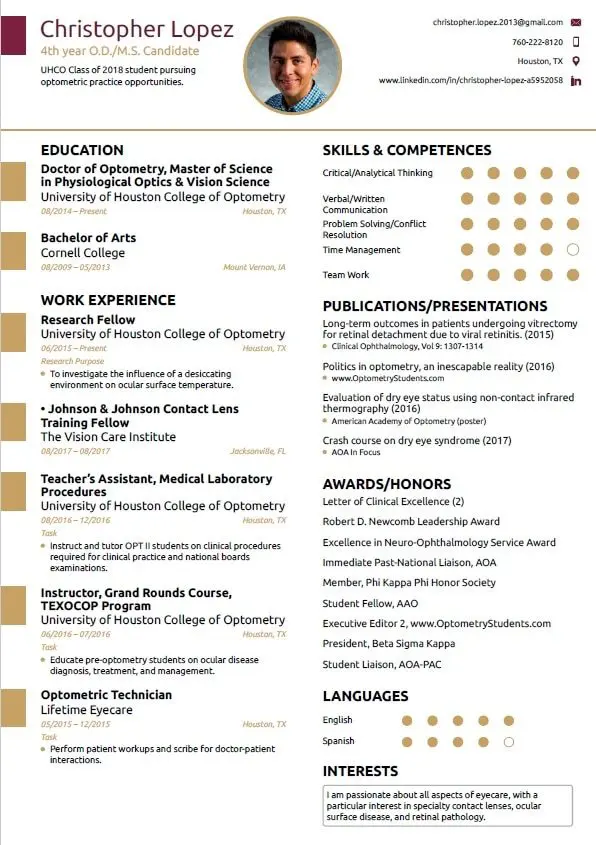Crushing Your Job Search Post-COVID-19

To say we are currently living in a stressful time is an understatement. The COVID-19 pandemic has wreaked havoc across the globe. While the majority of media coverage has focused on the number of illnesses and tragedies that have occurred (and rightly so) there is another aspect to the current crisis that hasn’t been getting as much attention as it deserves. That is: the economic consequences will draw a dire arrow through the heart of many businesses, small and large, across the country.
Some reports have stated that over 30% of small companies will not be able to endure the financial strain that national and local lockdowns have rendered on business, if persisting longer than a couple of months. Optometry, unfortunately, is no exception.
With many ODs finding themselves laid off or furloughed the market for recruiting quality optometrists will be at an all-time high. Likewise, an abundant number of ODs now have the occasion to seek out career prospects they may have disregarded previously.
Consequently, the skills required to successfully navigate the job search are vital to landing the right position. Now more than ever, learning how to discover a suitable job opportunity, as well as keeping your resume and curriculum vitae (CV) up-to-date, will help you achieve career success.
Here are some tips for seeking optometry employment opportunities during this time. While the bulk of this article is targeted towards students and new grads, more seasoned ODs may find it useful as well.
(1) Decide what you want
Write down what you want. What practice setting do you see yourself in (private, corporate, OD/MD, etc.)? Would you prefer a rural, urban, or suburban setting? Do you want to be a business owner? Do you want to focus on a “niche” or specialty area of optometric care?
For example, before I started my job search, I decided that I wanted to work in a group OD setting seeing a mix of routine, medical, and specialty contact lens exams with future ownership opportunities. I sought out opportunities that appealed to these criteria. I got most of what I wanted, albeit I did not execute as much specialty contact lens care as I would have liked, nor did I stick around long enough for buy-in. Regardless, knowing what you want can serve as an important guiding tool in your job search.
Professional Tip: Take the time to actually write down what you want. Of course, it’s subject to change, but there’s something about the process of writing it down and reviewing it that
(2) Where to apply
Once you decide what direction you want to pursue, you must know where the current job openings are to be found. There are dozens of sites with optometry job postings such as:
- Indeed
- AOA (Only for Members)
- Local Optometry Associations
- Optometry School
- Upcoming OdsonFinance Job Board (Estimated Live Date= 6/2020)
Some non-traditional methods include reaching out to your network to see if a connection may know a doctor who is hiring. If you really want to make an impression, consider visiting a nearby office in-person (try to give the office a heads up, especially if it’s a busy clinic).
Lastly, recruiters may be a great resource to assist in the job search. Recruiters often, but not always, serve a certain niche, such as seeking talent for corporate optometric locations, or OD/MD settings.
It can be a challenge working with recruiters, as some take a laid back approach whereas you would like them to be more aggressive with opportunities. Others may be working hard to collect placement fees, so they may push harder than you are comfortable with. The key is finding one that strikes a balance between the two personality types.
Recruiters often ask you questions to get an idea of what you’re looking for, as well as share what their clients are looking for to find the best match. The best part is that most optometric recruiters get paid by the hiring party, so you have access to them at no cost to you!
Professional Tip: When planning to apply for a lot of jobs, save yourself time and create email templates for specific purposes (applying for a position, scheduling an interview, post-interview follow-up, etc.).
(3) Be open
“NOW HIRING: Seeking an optometrist who would like to make $300,000/year, examine two patients/hour, utilize updated equipment, Work 9am-5pm four days a week, no weekends, health insurance covered, 5% 401k match, not to mention a $10k sign-on bonus!”
Sounds pretty good, right? Once you wake up from your dream, you’ll realize that these opportunities don’t really exist (and if they do, let me know!). Suffice it to say that while it is great to have goals, your aspirations may need to be tempered with a bit of reality. Would you work on Saturdays even though you want weekends off? If you are a low vision guru, wouldn’t it be great to fill your books with low vision exams? What if you only perform one low vision exam a day? How about one a week? Would that be a reason to turn down a job offer? Would you have to reach out to surrounding offices and resources to solicit more low vision referrals? Is that something you would be open to doing? These are examples of questions you should be considering regarding your interests.
Job seekers should expect to reach an agreement with their employer to best satisfy the desires of both parties. This is where the negotiation phase of the career search comes into play (stay tuned for an inside look on negotiation and interviewing in the next article).
For example, you may have to deal with examining two children a day even if you aren’t fond of pediatric exams. You may be stuck performing glaucoma care when you’d rather focus on anterior segment disease. Job seekers should have reasonable expectations and be open to providing services or having availability that they may not otherwise be in favor of - in order to compromise with their employer and make the best of new opportunities. Demonstrating that you are willing to do what it takes to help the practice grow will help you stand out as a premiere candidate.
For example, I despised the idea of working weekends. However, I realized that Saturdays are great for business and I could generate a great deal of revenue working half a day. With that in mind, I agreed to work a half day on Saturdays in return for one weekday off per week. Much to my surprise, having a day off during the week turned out to be an amazing experience! I was able to relax and recharge midweek. I scheduled doctor appointments, haircuts, and other appointments for that day. Moreso, I was able to pick up my daughter earlier from daycare and spend more time with her. Had I not initially acquiesced to working weekends, I would not have been able to get as much done during the week and devote more time with my family.
Sometimes gifts are found in unanswered requests.
Professional Tip: There’s nothing wrong with bargaining for what you want, but negotiation is a two-way street, and the truth is: until trust can be built, there will always be feelings of uncertainty between an employer and potential employee. Compromise works best when both parties are open, honest, and willing to allow for a little “wiggle room.”
(4) Research opportunities
At the risk of sounding patronizing, I cannot fail to mention that researching the career opportunities that you are interested in before interviewing is of the utmost importance. Of course, this sounds obvious; but I am shocked by the number of interviewing students whom I’ve spoken to that do not take this necessary step. Go online and scour the practice website. Read every page, read the doctor profiles, read the services provided, etc.
How silly would you look if you told the interviewing doctor that you would like to focus on managing patients with glaucoma, macular degeneration, and other retinal pathology only to find out that the hiring doctor owns a pediatric eye care practice? (Yes, this did happen).
Professional Tip: Researching a practice only takes a few minutes but it can leave a lasting impression on the interviewer. Doing your due diligence establishes preparation and a level of respect. Disregarding this point demonstrates carelessness and neglect.
(5) Resume and CV
It goes without saying that a job search is incomplete without a proper resume. In short, a resume provides a brief, but concise, snapshot as to who you are. Most employment opportunities require submission of a resume; however, some may also ask for a curriculum vitae, or CV. While everyone should have an updated resume, most job seekers do not have a CV prepared, as they are most often used for positions in academic or research-based settings. More information regarding resumes and CVs can be found here. (Check out how to write the Perfect Optometry Resume)
An example resume (mine, to be exact) can be seen below.
In short, a resume provides a brief, but concise, snapshot as to who you are
Conclusion
There’s no sugar coating it; times are tough right now for many of us, myself included. A number of us are dealing with salary cuts, or worse, unemployment. However, I am a big believer that there is opportunity anywhere and everywhere you look.
If you are uncertain of your future job, whether you are currently furloughed or you are a fourth-year OD student beginning your job search - take this time to reevaluate career goals and future opportunities that will help you achieve them.
The success of your job search boils down to preparation, attention to detail, and hard work. Don’t sit on the sidelines. Take charge.


Facebook Comments